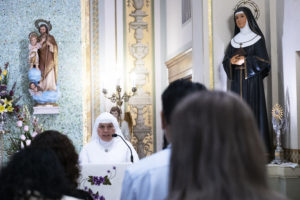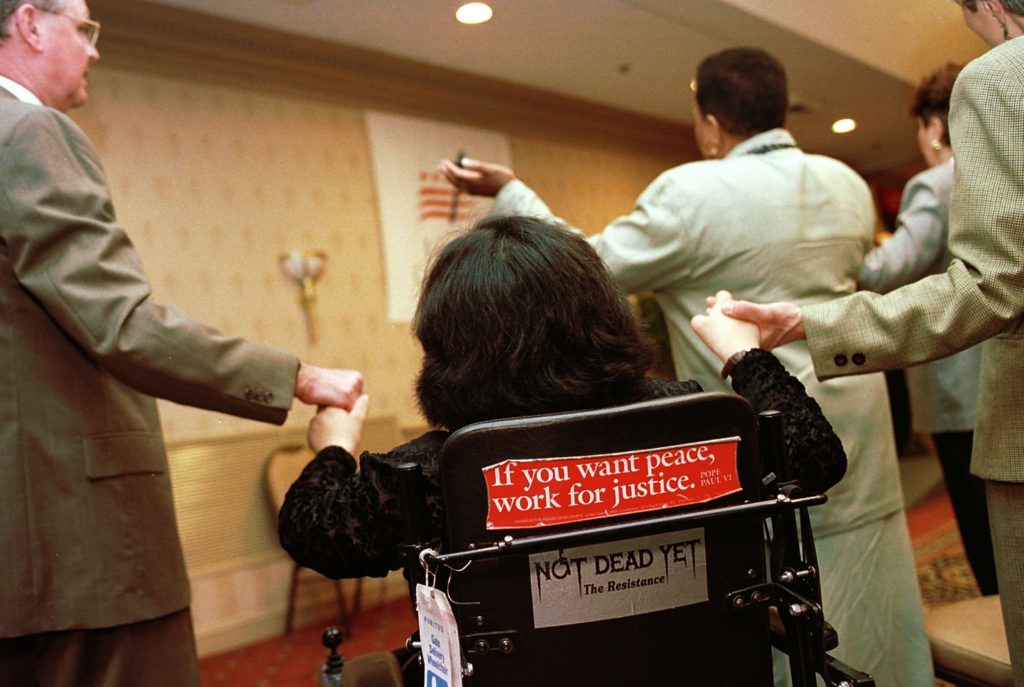Being in a wheelchair has never stopped Lillibeth Navarro.
The 67-year-old has spent decades fighting for disability rights through lobbying, speeches, and even protests that led to her arrest.
Now Navarro says she’s fighting for more than just equality — she’s literally fighting for her life.
The activist for both disability rights and Catholic causes is part of a new lawsuit challenging California’s assisted suicide law, claiming it’s a threat to the disabled and minorities.
“Our lives are in danger!” implored Navarro, founder and executive director of Communities Actively Living Independent and Free (CALIF). “We don’t want our rights ignored or obliterated because we’re expensive to care for, or because our lives are perceived as useless … there is use for us.”
Attorneys representing four disability-rights organizations, including CALIF, filed suit in Los Angeles County April 25 in an effort to overturn the state’s physician-assisted death law. The plaintiffs claim people with life-threatening disabilities and suicidality are offered a “state-facilitated death” while other patients are offered treatment. The plaintiffs also say recent laxing of the law’s safeguards, including the 15-day waiting period, makes it all the easier for the disabled to kill themselves.
“It takes 10 days to buy a gun in California, it takes 48 hours to get this lethal medication,” noted one of the lawyers, Michael Bien. “What do you do when someone is suicidal? You take away lethal means … you don’t make it easy.”
The lawsuit names various state agencies and officials, including Gov. Gavin Newsom. It asserts the End of Life Option Act (EOLA) violates equal protection and due process guaranteed by the U.S. Constitution and violates anti-discrimination provisions of the Americans with Disabilities Act and the Rehabilitation Act.
In their complaint, CALIF, United Spinal Association, Not Dead Yet, Institute for Patient’s Rights, and individual plaintiffs Lonnie VanHook and Ingrid Tischer, argue they are more likely to be denied quality care and “steered” toward life-ending drugs because of racism and ableism. For proof, look no further than the COVID-19 pandemic, they say.
“People with disabilities and people in minority communities were denied things like ventilators. They were at the bottom of the list,” said Barbara Lyons, special projects coordinator, Patients Rights Action Fund. “[The disabled] feel assisted suicide is another area where they are put on the bottom of the list.”
Lyon’s words echo Pope Francis’ repeated critiques of a modern “throwaway culture” that discards people considered a nuisance or unuseful.
“It is especially the weakest who are treated this way: unborn children, the elderly, the needy and the disadvantaged,” said the pope in a Jan. 29 address. “But people are never to be thrown out. … Every person is a sacred and unique gift, no matter what their age or condition is.
Sister Margarita Rico, S de M, ministers to hospice patients in the Los Angeles area as a member of the Servants of Mary, Ministers to the Sick and a registered nurse. She said she’s seen firsthand how patients can be “pushed” into assisted suicide when they feel like a burden to others. Part of her mission, she said, is teaching patients and their families about how to endure illness with dignity and faith.
“Christ suffered for us and we are sharing in that suffering … there is redemptive value that Jesus Christ taught us through his suffering on the cross,” explained Rico. “We also tell [patients] there is always hope. We need to keep that vision of hope.”

Rico said that can be hard for hospice patients who are depressed, but that’s why we need to minister to the whole person. She recalled a cancer patient and anesthesiologist who wanted to die.
“In the past, he used to help people and now he was helpless. … In his desperation he wanted the whole bottle of morphine,” recalled Rico. “But little by little, through the care of the sisters and the commitment of his wife, he got out of his depression.”
Not everyone is as fortunate. The plaintiffs said finding support and services can be overwhelming. Bien knows this firsthand: When his late wife, civil rights attorney Jane Kahn, was discharged from the hospital when no further treatment could be done for her terminal brain cancer, she considered assisted suicide.
“I didn’t know how to get the house ready. I didn’t know how to take care of her. It was a little frightening,” said Bien. “[No doctor] asked, ‘Have you gotten a referral to home health care yet?’ ‘Have you gotten hospice?’ What if they had acted like real doctors and done that?”
Bien said there’s a need to acknowledge what makes assisted suicide “attractive”: “If someone is facing death, they think this is going to give them an out.”
After the original assisted suicide law was passed in 2015, California’s Catholic bishops helped launch the “Whole Person Care Initiative,” providing tools and training to parish leaders to better accompany the terminally ill.
The bishops also spoke out against amendments to the law passed in 2021 that removed multiple “safeguards” built into the law, including a 15-day minimum waiting period between two requests for lethal drugs.
Navarro said she too was “disheartened” by the amendment, but it also strengthened the kind of resolve she’s had to tap into for most of her life. She was only 5 months old when she contracted polio in her native Philippines. The disease left her disabled and she now contends with post-polio syndrome, which can cause increased muscle weakness and breathing problems.
In addition to having internal fortitude, Navarro said she takes comfort in her Catholic faith and the fact that she follows a God that knows suffering like she does. She’s also lectured on end-of-life and pro-life issues.
The plaintiffs said they won’t give up in their fight against assisted suicide and will appeal if they lose in court. Navarro said it’s not only for themselves, but for a better society.
“If we want to be a humanity that makes progress, let it not be only in things like technology … let it also be within our hearts. When the heart is right, then entire humanity rises.”

